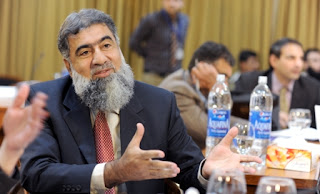 The International Health Links Funding Scheme
(IHLFS), launched by THET, UK-based International Charity and the British
Council and funded by DFID, initiated a partnership between the Pakistan
Institute of Medical Science (PIMS) and King’s College to address the lack of
importance given to mental health issues. Under this link, PIMS has organised
training for over 300 psychiatrists, lady health workers, school and college teachers
and media professionals to help them recognise mental health problems and deal
with them sensitively and efficiently.
The International Health Links Funding Scheme
(IHLFS), launched by THET, UK-based International Charity and the British
Council and funded by DFID, initiated a partnership between the Pakistan
Institute of Medical Science (PIMS) and King’s College to address the lack of
importance given to mental health issues. Under this link, PIMS has organised
training for over 300 psychiatrists, lady health workers, school and college teachers
and media professionals to help them recognise mental health problems and deal
with them sensitively and efficiently.
Shagun Irfan, the principal of City School
The training helped her identify students
suffering from dyslexia, autism and bipolar disorders in her school. According
to Shagun, “I am now able to persuade the
parents of children who suffer from mental health problems to seek medical
help. I am also organising more talks in the school and inviting guest speakers
to talk about stress management, mental health disorders and how to tackle
these issues.”
 Recently, PIMS in partnership with King’s
College organised another series of training for Lady Health workers. During
these training sessions, over 60 Lady Health Workers will be trained on mental
health issues. These Lady Health Workers will act as Master Trainers and
cascade this training further.
Recently, PIMS in partnership with King’s
College organised another series of training for Lady Health workers. During
these training sessions, over 60 Lady Health Workers will be trained on mental
health issues. These Lady Health Workers will act as Master Trainers and
cascade this training further. 

